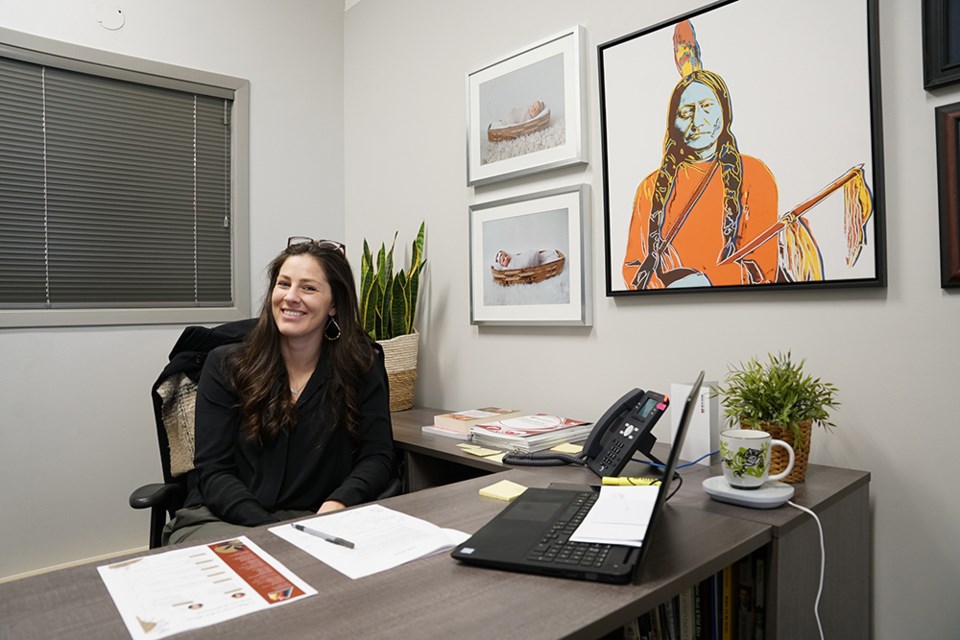School District 47 (SD47) students are ahead of the provincial graduation requirement for Indigenous education.
The provincial ministry of education and child care has mandated that effective the 2023/2024 school year, all students working toward a BC certificate of graduation must successfully complete at least four credits in Indigenous-focused coursework. Students are already working to meet the requirement.
SD47 district principal of Indigenous education Jessica Johnson said from equity recommendations, the school district saw that it has a barrier.
“For us, it would be nice to target a specific group to make sure we know as a school district that students are being prepared with Indigenous knowledge before they graduate,” said Johnson. “We were having conversations with our English department because that was where we had identified that every student has to take English 10.”
It was determined that this course would be the best place to integrate the Indigenous education requirement.
Johnson said the First Nations Education Steering Committee (FNESC), working out of Vancouver and representing First Nations, has been integral in advocating for Indigenous education for a long time.
“The FNESC has already put together an English first peoples resource that is part of the BC curriculum, and so through that curriculum it is essentially the same as English 10,” said Johnson. “It just calls in an Indigenous perspective, stories and ways of learning into that specific curriculum.”
Johnson said it was determined that this would be a great opportunity for students to have this new access to learning, so it was recommended that this English course be the grade 10 offering. She said about a month after these conversations were ongoing, the ministry announced they were going to have the graduation requirement.
“When students are presented with the opportunity to learn, it sparks curiosity and they often seek out more knowledge,” said Johnson. “A lot of us were not taught about Indigenous people, or by Indigenous people. We want to break down barriers for all learners and also give them this rich opportunity for learning from Indigenous people who have amazing skill sets and knowledge.”
Johnson said the English 10 curriculum is such that the content and focus is on Indigenous stories and perspectives. She said the authors, poets and storytellers are meant to be Indigenous, so students have the opportunity to learn from them. She said the FNESC worked for a long time on putting together a meaningful curriculum.
“A nervous English teacher could take the FNESC document and follow it step-by-step and get through the full curriculum, guided by the Indigenous people and Indigenous voices that put together that document,” said Johnson. “From there they could make it their own and call in local knowledge-keepers and have local perspective in the course.”
Graduation requirement
The course is the students’ English 10 offering. All students must take this course as part of their graduation requirements. The course was implemented in September 2022.
“This first cohort of students will have had English First Peoples as their grade 10 offering,” said Johnson. “I think next school year is when students will need to graduate with their Indigenous-focused graduation requirement. Our students from this year will be prepared when they graduate because they have taken this course.”
Johnson said teachers wanted to feel prepared when they took this on so the district offered learning and professional development. She said there is also an English First Peoples group coming together, and local teachers will be sent to benefit from that as well.
“We’re trying to make sure teachers have the tools and skill sets to feel confident doing the work,” said Johnson. “I believe students are getting a lot from it and the teachers who are teaching it are enjoying it.”
At the elementary level, a teacher was hired this school year who goes around to all the elementary schools to work specifically with teachers to build their skill sets and repertoire around calling Indigenous worldviews into the curriculum. The teacher can coach teachers and co-teach.
“It is happening at the elementary school level as well,” said Johnson. “There is not a ministry requirement at the elementary level for graduating so it feels a little bit more organic. It’s having a big impact.
“We’re always trying to evolve and adapt to the needs of the schools and the students.”


